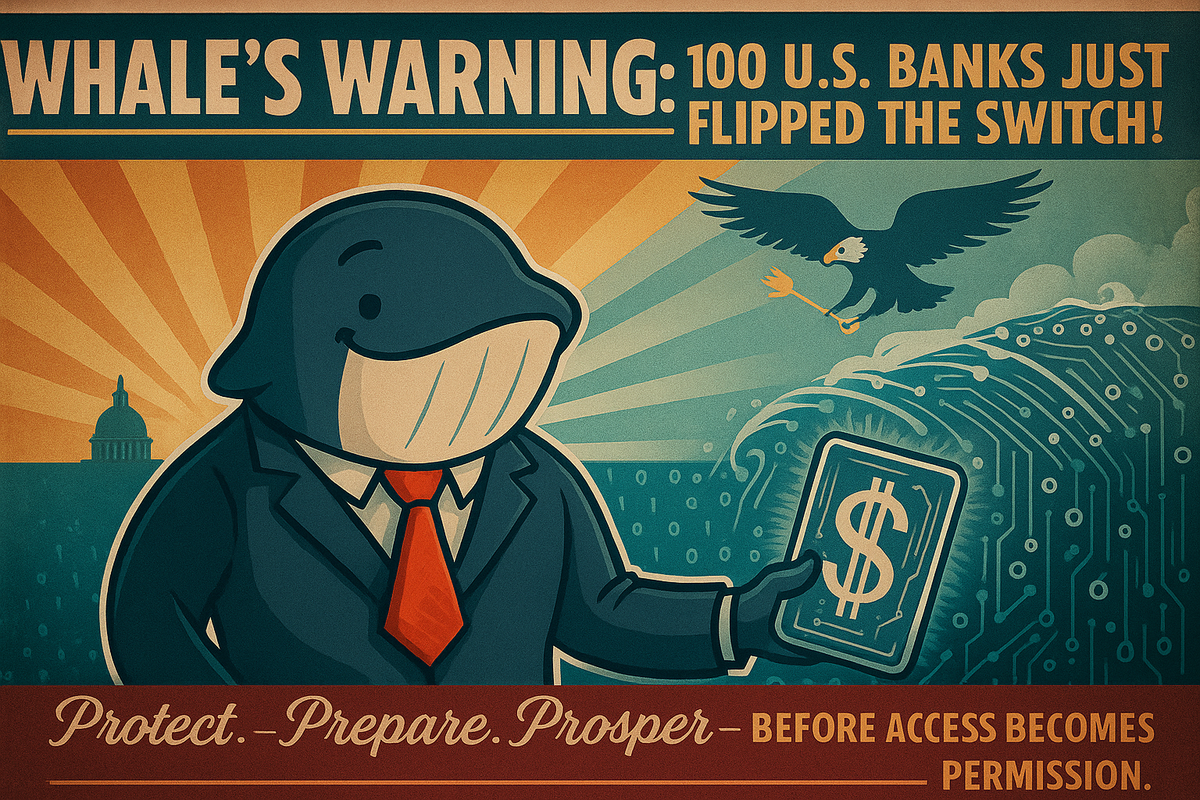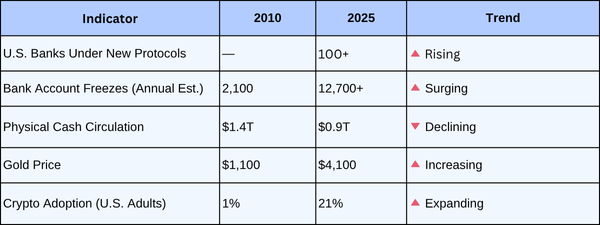🐋 Whale’s Warning: 100 U.S. Banks Just Flipped the Switch

Good day, dear reader — Whale Investor here.
Financial systems don’t shift overnight with spectacle; they evolve quietly, beneath the surface, through gradual compliance and acceptance. The control that once came with noise now slips in as a tide—soft at first, but relentless. What was once a promise of protection through digital infrastructure increasingly reveals itself as a lever for power. Today, this quiet transformation takes a decisive step forward: over 100 U.S. banks have already agreed to a new framework that subtly redefines ownership and access to your money. The rules are changing again. Few notice, but the currents beneath us are becoming stronger, deeper, and harder to navigate.
Five Emerging Systemic Risks from Centralized Financial Control
1. Programmable Currency Risk
Digital and centralized banking rails now enable transaction control in real time—a development with profound implications. Authorities can impose limits, freeze transfers, or reverse payments instantly based on opaque criteria. Unlike physical cash, programmable currency embeds mechanisms of control by design. Every transaction can carry strings, fundamentally transforming ownership from something private into something conditional.
2. Frozen Access Phenomenon
The so-called “temporary compliance review” has quietly morphed into indefinite account freezes with little recourse or accountability. When access to funds can be suspended without transparent review, it effectively hands power from individuals to institutions. This subtle erosion of financial autonomy often comes wrapped in regulatory jargon, denying everyday people their right to immediate and fair access.
3. Privacy Erosion Loop
Surveillance of financial activity expands rapidly under the banners of anti-money laundering (AML) and national security. Every transaction, every payment, every digital footprint becomes part of an ever-growing database monitored by both institutions and government agencies. The consequence: privacy dissolves while purportedly protecting us, leaving citizens exposed to a system that assumes suspicion and demands compliance.
4. Liquidity Leverage
In this environment, liquidity is less about availability and more about control. Financial institutions, by controlling access and flow, wield disproportionate influence over individuals’ economic freedom. When liquidity equates to power, the balance tips away from the individual toward the centralized institutions.
5. Trust Compression
As control intensifies and transparency fades, confidence diminishes—even in well-functioning systems. This gradual compression of trust makes room for fractures beneath the surface. When trust is scarce, the resilience of entire financial frameworks weakens, increasing systemic risk over time.
From my vantage point, these changes rarely arrive with fanfare or alarm bells. Instead, control seeps quietly under the guise of routine updates and regulatory compliance—imperceptible yet inexorable.
Fighting the Current: Three Strategic Defenses
But while the current drifts toward control, investors still have the tide—and there are ways to move beneath the surface.
Solution #1: The Free Shield Kit
The first line of defense in this new landscape is immediate, actionable, and legal. The Free Shield Kit and guide offer a carefully constructed toolkit designed to help investors secure their wealth outside the system’s tightening levers of control. This resource show you the legal, IRS-approved way to move your money out of harm’s way. Consider taking action, while you still can.
What once sounded like a rumor is now underway.
Over 100 U.S. banks have quietly signed on to the new rules.
And now every account — from your everyday savings to your retirement plan — can be paused or frozen without warning.
This isn't a theory. It’s the new reality.
Your money can become a hostage of the system.
That’s why we’ve prepared 3 urgent steps to make sure Washington’s levers of control never touch your capital.
Claim your free shield kit today — before it’s too late.
Download Your Free Guide
Claiming your Free Shield Kit is not just preparation; it is a necessary step to fortify your portfolio—and your peace of mind—in an increasingly controlled environment.
Solution #2: Distributed Custody
Diversifying custody across jurisdictions, custodians, and forms is not rebellion. It is resilience. Holding assets in a range of formats—physical gold, crypto wallets beyond centralized exchanges, offshore accounts where lawful—fractures systemic control. Decentralization creates multiple touchpoints, reducing vulnerability. Like networks of ocean currents, diversity in custody strengthens overall endurance and fluidity.
Solution #3: Strategic Non-Dependence
True security blooms from independence. This means holding liquidity, tangible assets, and establishing private channels that allow you to operate autonomously—even when systems tighten or falter. Prioritize financial strategies that do not rely solely on wage income or institutional access. Build layers of autonomy today, before dependence becomes costly or impossible.
🌊 Whale’s Fact Break
Humpback whales navigate thousands of miles each year using Earth’s magnetic fields—a testament to how, even amid shifting currents, true direction comes from within. Similarly, in turbulent financial seas, internal navigation, knowledge, and adaptability are your surest compass.
Discover what's on everyone's lips
🏦 The IRS Hopes You Never See This Trump Loophole - ad by American Alternative Assets
📺 The Video Musk Showed Trump — Now You Can See It - ad by Behind The Markets
💳 0% APR Cards Just Dropped. Pay Off Debt—Without Paying Interest - ad by Finance Buzz
🧠 BREAKING: Musk’s DOGE Stimulus Goes to the Smartest Americans - ad by American Hartford Gold
Data Snapshot 📊


Priority Gold
Your IRA, Bank Account, and Savings Can Now Be Frozen Without Warning—All Thanks to Executive Order 14028
🐋 Whale’s Final Word
Financial freedom today is not paranoia—it is preparation. In a world where digital systems evolve to both protect and control, understanding these currents defines survival. Readers who stay composed and conscious amidst change will find ways to preserve independence and grow their wealth beneath the surface.
The ocean of finance is vast and deep. Those who learn to read the subtle undertows and adapt patiently navigate storms ahead with greater calm.
Swim vigilant,
- Whale Investor 🐋

